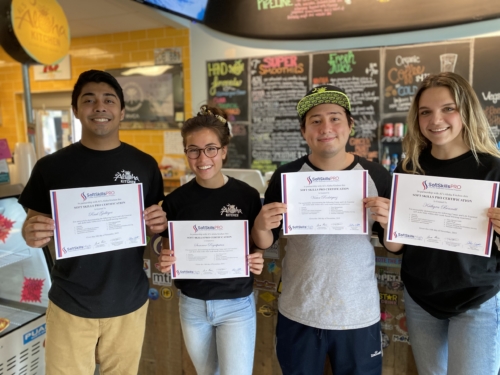The challenge of the century
It’s been more than 100 years since the Carnegie Foundation for the Advancement of Teaching released its groundbreaking study that revealed a surprising truth. What really works when it comes to career and workplace success? In the study, 1,500 working engineers were asked to rate the qualities they believed were most instrumental in determining the probability of success or failure in their field. Overwhelmingly, the respondents ranked personal qualities far higher in importance than knowledge or expertise:
- Oral and written communication
- Professionalism
- Work ethic
- Critical thinking/problem solving
In two words: soft skills
In 2013, Google reviewed its hiring data — accumulated since the company’s incorporation in 1998 — to determine the top career-success indicators. They were astonished; STEM expertise came in dead last. Atop the list were seven soft skills.
Mark Butler, commissioner for the Georgia Department of Labor, recently commented, “The biggest reason people aren’t getting work right now is not so much a lack of technical training; it’s really their lack of soft skills.”
Why is it so hard to close the soft skills gap?
That’s what Cindi Reiman, founder and president of the American Hospitality Academy (AHA) — and a pioneer in bridging the gap between what young people know and what industry demands — set out to discover when she created Soft Skills High. In the 30 years prior, AHA provided career-focused curriculum and structured internships for thousands of college students from around the world.
“It was through these close working relationships with industry leaders that our team developed a clear understanding of how to best teach the 21st century skills that are vital to success in any career,” Reiman said. “But the teaching had to start sooner, while the kids were still learning about life.”
Reiman and her Soft Skills High team spent months creating their online curriculum, and then it was time to put it to the test. In 2017, with a grant from District 150 and the support from Michael Kuhn, principal and director at Woodruff Career and Technical Center, Reiman returned to her hometown of Peoria, Illinois, to pilot Soft Skills High with its flagship course: Career and Life Essentials. Delivered completely online, the course consists of 10 interactive modules. Eventually, 12 high schools across five states participated in the program.
Reiman and her team identified three issues that would need to be addressed in order to deliver an effective soft skills curriculum.
A successful soft skills curriculum must complement current course offerings and be easily integrated into high school programming.
Schools and teachers needed an online and engaging program that could be incorporated into student coursework. Due to the flexibility of the Soft Skills High platform, teachers reportedly discovered many ways to incorporate the program into their students’ schedules.
A successful soft skills curriculum enables teachers to keep their core content intact.
Soft Skills High is geared specifically for high school students and demonstrates best practices for integrating instruction into the school day. The employability skills program operates as a true virtual school with live course facilitators, classmates and discussion boards. Soft Skills High eliminates the burden of creating lesson plans and enables teachers to keep their current core curriculums intact.
A successful soft skills curriculum will assess students’ progress.
Soft Skills High offers various methods of assessing student progress and engagement including quizzes after each module, discussion boards and writing prompts, as well as a final exam. Upon successful completion — a score of 70% or higher — students receive a certificate to validate their accomplishments. Additionally, teachers have easy and instant access to student data on the Teacher’s Desk.

Get ready. Get prepped. Go!
Two years after the successful pilot program, Soft Skills High still begins with the Career and Life Essentials course designed to get students ready for career and life success. The second step, Career Prep, was developed to prepare students for the workplace; in this course, they benefit from the opportunity to build a career portfolio that includes self-assessments, goal setting, resume and interviewing skills. Then it’s time to go into the Soft Skills Pro certificate program where students showcase their competency on the job, earning an industry credential.
“At Soft Skills High, it’s our hope that our students become better and more successful people today who go on to become better and more successful employees tomorrow.”






